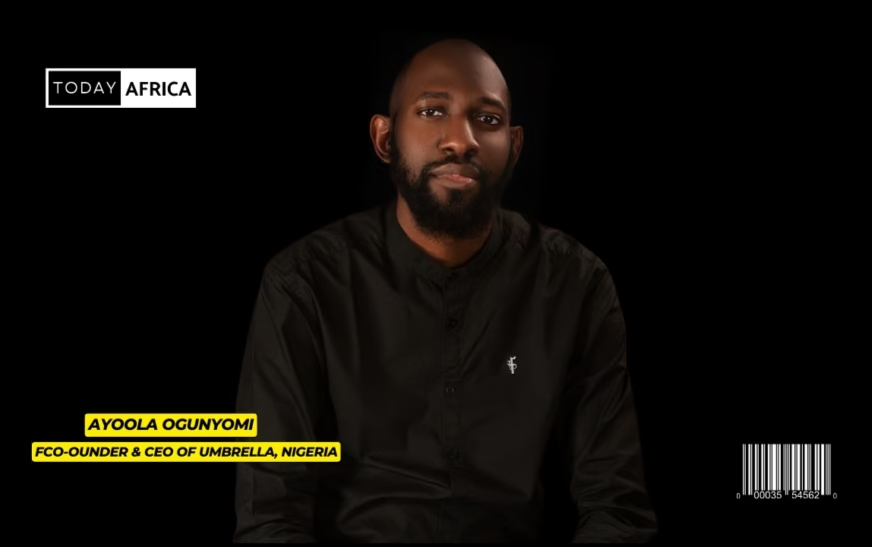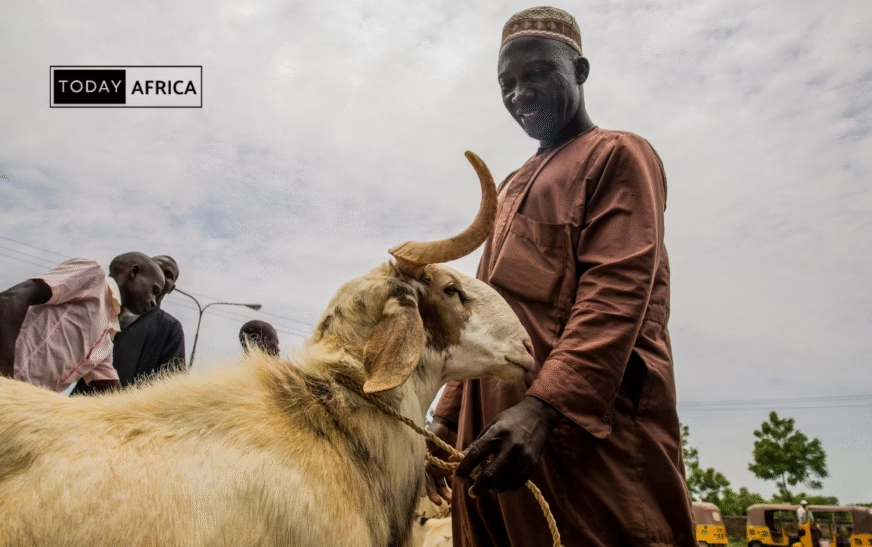Known for his curiosity and drive, Ayoola Ogunyomi has actively pivoted into emerging technologies, including cryptocurrency, blockchain, AI, data science, and design thinking.
He is the co-founder and CEO of Umbrella, a platform designed to bridge the investment-exit gap in Africa’s startup ecosystem by connecting vetted startups, investors, and advisors under one trusted structure.
Ayoola Ogunyomi shared his entrepreneurial journey with Today Africa.
Tell us more about yourself
“I see myself as an innovator. I’ve been within the marketing space,” he says. “I spent 14 years building brands, building businesses, and also building people.”
This curiosity led him deep into cryptocurrency, blockchain, AI, data science, and design thinking. Beyond being a marketing expert, he’s a multi-disciplinary thinker. Add to that his passion for investing, a voracious reading habit, and you get a man as nimble with strategy as he is with empathy.
“I failed growing that business,” he says now, unflinchingly. “That pushed me back to paid employment. But that failure gave me a deeper insight into what was broken. Not just in my business, but in the entire African startup space.”
He is Ayoola Ogunyomi, co-founder and CEO of Use Umbrella, an ecosystem that makes startup investments and exits possible in Africa.
Fourteen years in marketing gave him tools most startup founders often overlook: brand-building, consumer insight, storytelling, and most importantly, an understanding of people. Now he is applying that to help founders, investors, and advisors converge, not in chaos, but with his brand, Use Umbrella.
“I work as hard as I play,” he chuckles. “That’s me.”
What inspired the creation of Umbrella?
“What we saw was clear: African founders struggle to raise capital. And investors, especially foreign investors, struggle to find credible startups or a clear path to exit,” he explains.
The problem was as consistent in Nigeria as it was in Rwanda and Kenya. His team began running surveys, speaking with founders and investors, and quickly realized the issue wasn’t one of innovation, but infrastructure. There was no trusted, structured way to raise, invest, and exit across the continent.
So they built it.
Umbrella isn’t just a platform—it’s an ecosystem. A verified marketplace where startups are visible and vetted, where investors are matched transparently, and where exits, once whispered about, are something to be celebrated.
Read Also: How Christopher O. Fallah Empowers Liberia’s Unbanked & Offline Citizens
Why call it ‘Umbrella’?
The name didn’t come from a branding agency, nor a random brainstorm. It came from memory, of his own early career, and the mentors who changed it.
“I had two or three mentors back then,” Ayoola reflects. “And I probably wouldn’t have gotten where I am if they didn’t help me navigate the terrain.”

He realized founders didn’t just need money, they needed guidance. People who could help them through murky legal landscapes, product pivots, and investor negotiations.
“An umbrella protects. From rain. From the sun. That’s what we’re doing here: we’re shielding founders, investors, and advisors by building a space of trust.”
As they kept saying, “We’re bringing everyone under one umbrella,” the name just stuck.
What problems is Umbrella really solving?
The African startup ecosystem is full of talent and ideas. What’s missing is access, trust, liquidity, and support.
- Access: Most founders aren’t connected to capital or advisory networks. Likewise, many investors can’t find well-vetted startups.
- Trust: Foreign investors don’t always understand local markets. Without transparency and due diligence, deals fizzle.
- Liquidity: Exits are rare. Umbrella introduces mechanisms like secondary sales, share buyouts, and structured acquisitions.
- Support: Founders get localized guidance, mental health support, and advisory services. “Support for us isn’t just financial—it’s emotional and strategic,” he explains.
Through community-driven initiatives like Umbrella Saturdays and Tech Garage, Ayoola hosts honest conversations between founders, advisors, and investors, shedding light on why founders get rejected and how to bounce back.
Ayoola continues, “Most recently, we’re going to be launching our first deal lounge. It’s called a Deals Lounge, where investors can interact with the founders.”
How exactly does Umbrella work?
Umbrella provides a verified pipeline of startups with data rooms, traction reports, and exit planning baked in.
Founders can:
- Raise capital
- Sell equity
- Plan and execute exits
Investors can:
- Browse vetted startups
- Receive curated deal flow
- Sell shares and exit when ready
But Umbrella doesn’t stop at the transaction. Post-deal support includes access to mental health professionals and follow-up advisory. “Building is hard,” Ayoola says. “We don’t just want you to succeed financially. We want you to stay sane.”
Read Also: How Buyiswa Twala is Reviving Dead Soil and Fighting Hunger in South Africa
Why don’t African founders celebrate exits?
“There’s pride in raising money,” Ayoola muses. “But when you exit, people think something went wrong. The founder failed. That the business was bought over because it was struggling.”

In contrast, Western founders celebrate their exits, turning into angel investors or launching new ventures. African founders? “They go underground,” he says. “Or they announce a new company, skipping the exit story altogether.”
That’s part of the stigma Umbrella wants to erase. “We want founders to be proud of building something valuable and exiting. And we’re going to help make that happen more.”
Why do startups fail, even after raising millions?
He leans back and pauses—this one hits close to home.
“I see it from three perspectives,” he begins. “One, founders raising for the wrong reasons. Two, lack of proper due diligence. And three, being disconnected from the customer.”
Startups collapse not just from poor ideas, but from:
- Founder lifestyles outpacing revenue
- Misunderstood regulations
- Weak business models
- Vanity metrics (“downloads don’t mean dollars”)
- Burn rate mismanagement
- Assuming instead of listening to customers
“Failure isn’t shameful,” Ayoola insists. “What matters is what you do after. How you pick yourself up.”
Umbrella plans to do deep-dive case studies on these failures—not to criticize, but to teach.
What roles do advisory cohorts and masterclasses play in supporting startup founders?
Ayoola doesn’t mince words: “Advisory is a stronger path to growth.”
Umbrella’s advisory model connects startup founders with seasoned operators and domain experts, both locally and globally. These aren’t just people with nice titles, they’re hands-on mentors who understand the trenches.
“They help startups with fundraising strategies, financial modeling, investor prep, go-to-market execution, and even legal compliance issues,” Ayoola explains. “Everything that makes the startup ecosystem work.”
The payoff? Faster fundraising. Sharper decisions. Unexpected partnerships.
“Sometimes, an advisor is in the same industry as the founder, and a conversation just leads to a deal or a collaboration,” he says. “I’ve personally seen it happen. I even sought out three advisors this year who helped us pivot through major challenges.”

And it’s not a top-down relationship. “We see advisory as mentorship,” he continues. “And with Umbrella Saturday, we bring these people into the room with founders to talk, to listen, to help.”
Read Also: African Startup Stories of 16 Entrepreneurs We Interviewed
What other ways does Umbrella support these startup founders?
While most platforms stop at advice, Umbrella built a full-stack system for founders to grow, from scratch to scale.
“It’s a self-service SaaS product,” Ayoola says, “where founders go through an investment readiness process.” This includes:
- a verified data room
- a multi-stage due diligence check
- and business model validation
Founders get more than just polish, they get placed. “We put them in front of investors and facilitate deal rooms. We connect them to grants and verified investor pipelines.”
But only after passing Umbrella’s litmus test.
“We do this only after vetting and verifying that the founders are investment-ready,” he insists.
Still, the tech is just the framework. The fuel is community, and they have the African Founders Community.
What roles does this community play in the growth of these startup founders?
“African Founders Community” may sound like another WhatsApp group, but inside it, over 250 founders collaborate, trade ideas, and sometimes land deals. It’s a virtual co-working space, with capital flowing between messages and feedback loops.
“We like to call it a lounge—where you meet people, capital, and collaborations,” Ayoola says. “We have investors and advisors in the mix, too. It’s peer-led, but it’s powerful.”
For founders facing isolation and confusion, it becomes a compass. “They share knowledge. They grow together.”
Read Also: How Njemo Naomi Launched Youthkonnect Amid Cameroon’s Sociopolitical Crisis
How do you ensure the quality and viability of startups to boost investor confidence?
Ayoola understands Africa is a “low-trust environment,” especially for venture capital. That’s why Umbrella doesn’t leave things to chance.
Each startup is put through a multi-stage verification process that includes screening, traction checks, founder interviews, and business model reviews.

“We score each deal for investor fit,” he explains. “And we match investors with the right appetite.”
Smart matching systems, soon to be powered by AI, help bridge the gap. “We make sure the startups are truly ready. They have a DD check on them and a verified tick on Umbrella once they get into the market.”
How did you build trust with founders, investors, and advisors?
Trust, Ayoola says, wasn’t an afterthought; it was the first challenge Umbrella had to solve.
“We didn’t just build the product because we wanted to,” he says. “We reached out to founders and investors.” What came back was clear: confusion, concern, and fear, especially from the investor side.
“Conversations came around trust, navigating the African terrain, not understanding regulatory and compliance issues,” he explains. “Heavy stuff-governance and the rest of it.”
Ayoola’s answer? Relentless transparency. Verified data. Consistent value delivery.
“Building trust in a low-trust environment is one of our biggest challenges,” he says. “That’s why we always say to VCs: we want to be your partner.”
And it’s why Umbrella doesn’t just vouch for startups, it prepares them to be investable.
“African founders need more than just capital,” he says pointedly. “They need clarity. Community. Expert guidance.”
Read Also: Can Organic Fertilizer Save Africa’s Farms? Solomon Ssekamanya Thinks So
Your thoughts on founders focusing more on fundraising and not revenue
“You hear a lot of founders raise money and then shut down,” Ayoola says. “Because they focused only on capital.”

The message he delivers to every founder he meets is sharp and clear:
“I’m not saying that at a very early stage you shouldn’t go for fundraising, but of course you should also put your eye on the revenue. You could get all the money for the product and marketing of the business, but if the revenue is not coming in, the business is still going to shut down.”
That’s where Umbrella steps in.
“Leave Umbrella to fix the capital for you,” Ayoola says, with the kind of calm certainty that only comes from experience. “You focus on building a business that works.”
Contact or follow Ayoola Ogunyomi:
Leave a comment and follow us on social media for more tips:
- Facebook: Today Africa
- Instagram: Today Africa
- Twitter: Today Africa
- LinkedIn: Today Africa
- YouTube: Today Africa Studio
















